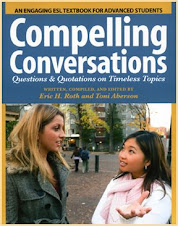Shall we discuss how to effectively challenge the tyranny of ETS standardized exams? May I strongly recommend reading this earnest critique by Clarissa, a frustrated English teacher who has taught TOEIC and TOEFL and prominent ESL blogger for many years?
TOEFL, TOEIC, and jobs « Readable Blog
As somebody who has often criticized - even ranted against - the overuse and misuse of standardized exams, consider me quite sympathetic of your analysis. It's also worth noting that no outside study has even found a correlation between TOEFL scores and actual academic performance in either university or graduate school. Although I'm less familiar with the TOEIC, it seems to share many of the perceived advantages for large institutions (test consistency, convenience, cost) and the same disadvantages (artificial context, limited scoring, weak correlation with alleged goals, excessive test preparation).
Having said all that, it seems a tad unfair to attack the TOEIC as " still not perfect or very realistic." Not perfect? Isn't that asking for far too much? No standardized test - and very few human endeavors - are "perfect." Noting the TOEIC is not "very realistic" in the next phrase only adds some irony to the critique. May I suggest it "not realistic" to expect any exam to be "perfect"?
Further, I'm not sure that we can wish away either the TOEIC or TOEFL or just advise our students to disregard the results. As an experienced TOEIC and TOEFL teacher, you have seen - first hand - the power to open doors or defer dreams that these strange standardized exams continue to hold. Scores matter. ETS holds real power. Power must be recognized.
Let us, instead, speak truth to power as your fine article does - and prepare students to develop their authentic English skills. For instance, I would recommend students both study for the TOEIC with both a traditional test prep book and the multiskill Target Score (Cambridge University) that correlates authentic newspaper articles to TOEIC vocabulary. In other words, we need to both help our students raise their scores and authentic English communication skills in the short run. TOEFL and TOEIC scores matter. We must be realistic in our counseling to students.
Of course, we also need to find ways to reduce the influence of standardized exams in both international companies and educational institutions, but that is a very daunting, difficult challenge. I would prefer, for instance, that universities supplement the TOEFL with their own language tests - especially for speaking skills. Videotaping a 10-15 minute interview, for instance, can fairly accurately assess student speaking skills and conversational abilities.
I deeply appreciate the author's profound misgivings about both the TOEFL and TOEIC. Far too few English teachers seem willing to note that the ETS emperor has far too few clothes on!
Ask more. Know more. Share more.Create Compelling Conversations.Visit www.CompellingConversations.com
Sunday, November 14, 2010
Friday, October 8, 2010
Looking for Quality, Free Conversation Lessons for Your Advanced ESL or EFL Class?
Are you looking for quality, free conversation materials for your advanced English class? Do you teach ESL to adult or community college students? Or do you teach English as a Foreign language (EFL) thousands of miles from home? And do you sometimes tutor private students to improve their conversation skills?
If so, do yourself a favor and check out the free quality conversation materials from the innovative textbook Compelling Conversations: Questions and Quotations on Timeless Topics now.
Enjoy these five free sample chapters including this month's feature PDF Making and Keeping Friends.
Enjoy!
Ask more. Know more. Share more.
Create Compelling Conversations.
Visit www.CompellingConversations.com
If so, do yourself a favor and check out the free quality conversation materials from the innovative textbook Compelling Conversations: Questions and Quotations on Timeless Topics now.
Enjoy these five free sample chapters including this month's feature PDF Making and Keeping Friends.
Enjoy!
Ask more. Know more. Share more.
Create Compelling Conversations.
Visit www.CompellingConversations.com
Tuesday, April 13, 2010
A Pleasant Surprise!
Sometimes people appreciate our ideas. Sometimes we find an educational site that shares our goals, perceptions, and priorities. Sometimes our efforts draw praise. April 13, 2010 provided a pleasant surprise as ESL teacher.
Under the title "Great Tips", a small, but influential American librarian's blog called eslconversationclubs.blogspot.com shared some ideas from Compelling Conversations. Naturally, I am quite pleased to both be recommended - and to discover an entire community of like-minded educators.
Here's the link to today's blog post to ESL educators, librarians, and conversation club coordinators:
http://eslconversationclubs.blogspot.com/2010/04/great-tips.html
After reading the article, I spent a satisfying hour exploring the deep resources on the blog that dates back several years. Among the excellent resources is a short two page document called ESL Conversation Clubs Best Practices by Jean Kaleda of webjunction.com that deserves a wider audience. Check it out here:
http://eslconversationclubs.blogspot.com/search/label/bestpractices
Enough said. Today provided some surprising validation that conversation clubs fill a vital, often overlooked, need for many American immigrants, ESL students, and other English language learners. And many experts find my little niche, self-published book a valuable, accessible resource. Consider me satisfied!
Ask more. Know more. Share more.
Create Compelling Conversations.
Visit www.CompellingConversations.com
Under the title "Great Tips", a small, but influential American librarian's blog called eslconversationclubs.blogspot.com shared some ideas from Compelling Conversations. Naturally, I am quite pleased to both be recommended - and to discover an entire community of like-minded educators.
Here's the link to today's blog post to ESL educators, librarians, and conversation club coordinators:
http://eslconversationclubs.blogspot.com/2010/04/great-tips.html
After reading the article, I spent a satisfying hour exploring the deep resources on the blog that dates back several years. Among the excellent resources is a short two page document called ESL Conversation Clubs Best Practices by Jean Kaleda of webjunction.com that deserves a wider audience. Check it out here:
http://eslconversationclubs.blogspot.com/search/label/bestpractices
Enough said. Today provided some surprising validation that conversation clubs fill a vital, often overlooked, need for many American immigrants, ESL students, and other English language learners. And many experts find my little niche, self-published book a valuable, accessible resource. Consider me satisfied!
Ask more. Know more. Share more.
Create Compelling Conversations.
Visit www.CompellingConversations.com
Sunday, February 14, 2010
What Qualities Do Adult English Language Learners Want in a Teacher?
What makes a great English teacher? Children and Adults apparently disagree.
Marisa Constantinides, a prominent EFL teacher and blogger, wrote a fascinating article that explores this issue in a fascinating post. Here it is.
http://marisaconstantinides.edublogs.org/2010/02/14/what-kind-of-teacher-are-you-are-you-in-your-students-hall-of-fame/comment-page-1/
While I have no experience teaching young child, the survey confirms my perceptions about the educational desires of adult students. Many adult students work and struggle in boring, stressful positions so they seek more creativity and passion in their English classes – and English teachers. Further, given the time pressures, instructors who both efficiently manage their classes and display patience are appreciated.
I would be curious, however, to know if there is a difference between various types of adult learners. For instance, many Business English classes in an EFL context include many middle-class professionals while many more working class adults attend ESL classes in English speaking classes. I also wonder if different ages of adults would provide different responses. Would younger working adults look for the same qualities as seniors taking an English class? Would creativity and passion still top the list of desired characteristics for English teachers?
The bottomline remains the same: our English students invest considerable time, energy, and often money into their studies. It behooves us to create compelling English lessons, exude energy, and patiently, clearly their "good mistakes".
“I cannot teach anybody anything, I can only make them think.”
Socrates (BC 469-BC 399) Greek philosopher of Athens
Ask more. Know more. Share more.
Create Compelling Conversations.
Visit www.CompellingConversations.com
Marisa Constantinides, a prominent EFL teacher and blogger, wrote a fascinating article that explores this issue in a fascinating post. Here it is.
http://marisaconstantinides.edublogs.org/2010/02/14/what-kind-of-teacher-are-you-are-you-in-your-students-hall-of-fame/comment-page-1/
While I have no experience teaching young child, the survey confirms my perceptions about the educational desires of adult students. Many adult students work and struggle in boring, stressful positions so they seek more creativity and passion in their English classes – and English teachers. Further, given the time pressures, instructors who both efficiently manage their classes and display patience are appreciated.
I would be curious, however, to know if there is a difference between various types of adult learners. For instance, many Business English classes in an EFL context include many middle-class professionals while many more working class adults attend ESL classes in English speaking classes. I also wonder if different ages of adults would provide different responses. Would younger working adults look for the same qualities as seniors taking an English class? Would creativity and passion still top the list of desired characteristics for English teachers?
The bottomline remains the same: our English students invest considerable time, energy, and often money into their studies. It behooves us to create compelling English lessons, exude energy, and patiently, clearly their "good mistakes".
“I cannot teach anybody anything, I can only make them think.”
Socrates (BC 469-BC 399) Greek philosopher of Athens
Ask more. Know more. Share more.
Create Compelling Conversations.
Visit www.CompellingConversations.com
Wednesday, February 10, 2010
The Dogma of Dogme | Kalinago English
What makes a compelling classroom conversation, anyway?
This excellent overview of the Dogme teaching style, by ELT and Business English expert Karenne Joy Sylvester provides a solid primer. It also provides an intellectual "defense" of simple, authentic, and meaningful conversations in our ESL and EFL classrooms. If you are taking a methods class, you will especially appreciate this article. Check it out!
The Dogma of Dogme | Kalinago English
Ask more. Know more. Share more.
Create Compelling Conversations.
Visit www.CompellingConversations.com
This excellent overview of the Dogme teaching style, by ELT and Business English expert Karenne Joy Sylvester provides a solid primer. It also provides an intellectual "defense" of simple, authentic, and meaningful conversations in our ESL and EFL classrooms. If you are taking a methods class, you will especially appreciate this article. Check it out!
The Dogma of Dogme | Kalinago English
Ask more. Know more. Share more.
Create Compelling Conversations.
Visit www.CompellingConversations.com
Saturday, January 2, 2010
Happy New Decade! How Will We Change? Will We Discuss Change in Our ESL Classes?
Happy New Decade! How Will We Change? Will We Discuss Change in Our ESL Classes?
Ask more. Know more. Share more.
Create Compelling Conversations.
Visit www.CompellingConversations.com
Ask more. Know more. Share more.
Create Compelling Conversations.
Visit www.CompellingConversations.com
Subscribe to:
Posts (Atom)





